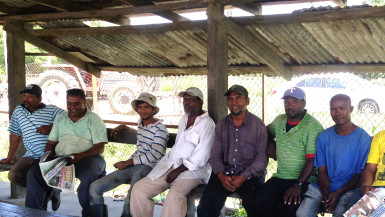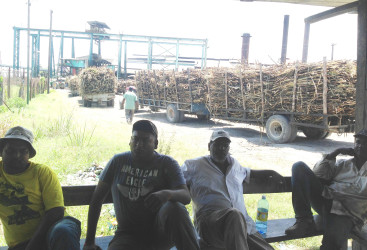Private cane farmers supplying cane to the Wales Estate remain distressed over its planned closure and feel that the management can consider other options to keep the estate working.
The government’s announcement that the estate will be closed after the end of the second crop this year has left both the estate workers and private farmers reeling. The government and GuySuCo have said that cane for the Wales estate would be processed next year at the Uitvlugt estate on the West Coast of Demerara but the private farmers are skeptical of this. The government and GuySuCo are still to lay out measures to make this feasible.
Some of the suggestions the farmers made in a recent discussion with Stabroek News include, producing bagasse on a larger scale for use in the boiler and to supply power to the national grid.
They also said that: “GuySuCo could bottle and sell molasses and use a filter press with bagasse to make potting mix [organic fertilizer] to sell to gardeners”.
They told Stabroek News: “nothing is wrong with the factory. It is performing well. It is just that management is poor.”

The private farmers supply 60% of the cane to the estate and said “the factory has a lot of down time because not enough cane is produced due to the poor estate cultivation.”
Mohamed Khan of La Grange, West Bank Demerara has been engaged in cane farming for over 40 years and plants over 60 acres of cane land.
He has no other means of earning an income and is distressed that because of the planned closure, this is the last year he would be supplying cane to Wales.
He is unsure what the future holds and compares the situation to a “Titanic disaster.”
He was looking at the option of transporting the cane to Uitvlugt but recognized that “if I make three trips per day to Wales, I would only be able to make one trip to Uitvlugt.”
He said too that he was “barely making a profit” at Wales and would “run at a loss” if he goes to Uitvlugt. He too agrees that GuySuCo could have looked at options to keep the estate going.
Another farmer, Naresh Kissoon of Wales who has been engaged in cane farming for over 50 years, said the community would become depressed following the closure.
He said the situation has gotten him so frustrated that he has no choice but to abandon his land and migrate.
Take over

The farmers said that if government reconsiders closing the estate, they would be willing to “take over the cultivation and factory and run it efficiently.”
They said too that they have “farmers of all ages … and we depend solely on the cane farming to maintain their families.”
Farmers have to use punts from “Free & Easy to Belle Vue because there is no dam to use tractor/trailer to transport the cane.”
They lamented that it would cost GuySuCo millions of dollars to construct roads to transport the cane to Uitvlugt.
According to them, the Chief Executive Officer of GuySuCo, Errol Hanoman had announced that he wants to “bring Uitvlugt to a stage to produce 40,000 tonnes of sugar per year, but right now that estate is only producing 9,000 tonnes.
They lamented that if he was depending on the Wales cane to achieve that target, it would just be a dream because of the lack of a proper access road.
“What plans does GuySuCo have if they close the estate? They had clay brick and soap factory and dairy complex but those didn’t work. All had to close because of poor management.”
“We hope that good wisdom would prevail and they think properly before closing. This is leading to fear, anger and hatred and then social implications,” the farmers said.
“We are asking the President of Guyana [David Granger] and GuySuCo board to reconsider and to do an assessment to know the impact it would have on the residents.”
They pointed out too that the price they were getting for the cane was far below the retail price of $176,000 per tonne that GuySuCo was earning on the local market.
They have not been paid for cane supplied in 2015 but were told that they would receive a proposed price of $58,900 per tonne. “That price would drive us out of business in any case,” they told this newspaper.





